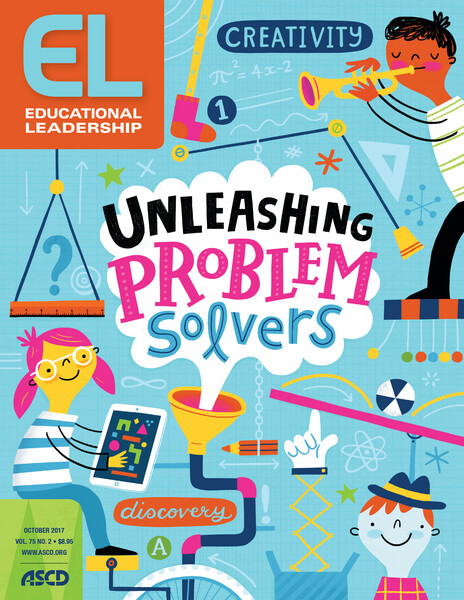It often surprises people when they find out that, although I'm now a math educator, I never really liked mathematics when I was a student. It wasn't that I was bad at math. I just never found any joy in the subject. My teachers demonstrated procedures that made it easy to arrive at solutions, and my classmates and I practiced those procedures until we had them memorized. Then we took tests to show how well we could follow the steps and arrive at correct solutions. For us, math was all about answer-getting.
Answer-getting is a narrow view of what it means to engage in mathematics. It encourages methodologies that focus on direct teaching of procedures and the use of mnemonic devices and other tricks for students to remember steps for performing calculations. Students in classrooms that focus on answer-getting are typically passive learners complying with prescribed approaches. Feedback often comes in the form of documenting correct and incorrect answers and mistakes in the procedures.
A Task in Three Acts
Today's world requires problem solvers, not answer-getters. We need people who understand how to analyze a situation, identify a problem, gather and sort available information, choose from a variety of methods for solving the problem, and communicate their reasoning. Problem solving is a process, and students need opportunities to engage in all aspects of that process to develop the skills and habits of mind to become effective problem solvers.
There are many ideas to bring more problem-based learning into classrooms. Many come from members of the online community known as the Math Twitter Blogosphere (#MTBoS), which is made up of educators from around the world who contribute tasks, activities, lessons, and reflections to help advance the teaching and learning of mathematics.
One instructional approach that's proven helpful began with a blog post by Dan Meyer called "The Three Acts of a Mathematical Story." Meyer, a former high school teacher and the chief education officer at Desmos, a California-based company that designs math education technology, contends that "storytelling gives us a framework for certain mathematical tasks that is both prescriptive enough to be useful and flexible enough to be usable." He says that many stories are divided into three acts, which lend themselves well to these tasks. In other words, the same elements that make stories compelling can make certain math tasks engaging.
A three-act task begins with a short video or image designed to evoke curiosity and interest in students. This is Act 1, and it is meant to be the hook that gets students invested in the problem. This is also where students identify the question they'd like to explore. Once they have a question to answer, the teacher moves to Act 2, which requires students to gather information and decide what information they need to answer their question. Act 2 also involves students actively working toward a solution in small groups (the bulk of the work during the task). Act 3 is when students present their findings to the class, often showcasing multiple solutions and strategies. Students argue their points and critique the reasoning of others. In the end, the teacher shows a final video or image that definitively answers the question and provides a satisfying resolution to the problem.
To understand the power of three-act tasks, it's helpful to see how they unfold in the classroom. The following vignette is from an elementary school where I have been working as a consultant and professional learning provider. The purpose of this visit was to engage the students in a three-act task I created so teachers could observe how these tasks unfold with students. As you read, I encourage you to reflect on the following questions: What is the role of the students? What is the role of the teacher? How does this experience differ from a classroom where students are given worksheets with division problems?
The Money Roll
Act 1
I was invited to work with K–8 students on problem-based learning tasks in a school district in western Massachusetts. One day, I set out a three-act task for a group of 21 4th graders. For Act 1, I played a short video that showed me holding a roll of bills (fig.1) before I stepped back and unrolled the bills across the floor in one long line (fig. 2). (View the video and all other media for this task here.) I then stopped the video and asked the students what they noticed and recorded their responses on chart paper.
Figure 1. I showed a roll of bills in the Act 1 video.

Figure 2. I then unrolled the bills in the Act 1 video.
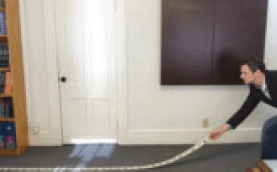
Jessie: You had a lot of money.
Teacher: What makes you say that?
Jessie: When it was all rolled up, it looked like a lot.
Efran: Yeah, and it rolled across the whole floor.
Teacher: What else did you notice?
Kiara: They looked like dollars.
Quinn: I think there are different kinds like one dollar, five dollars …
Teacher: So, there might be other kinds of bills besides one-dollar bills?
Quinn: Yeah, because you can't see them all when they're rolled up.
I then asked the students to share questions they had about the video and recorded their responses on another piece of chart paper.
Kade: How much money is there?
Mikal: How long is it [the whole roll of money]?
Jessie: I wonder why you even did it?
Teacher: It does seem strange, right?
Jenna: Is it your money?
D'Marion: How did you get them all to stick together?
Keisha: How many dollars are there?
Jessie: We already asked that.
Teacher: I think that's a similar question, but it seems like Keisha and Kade might be asking two different questions. Kade asked about how much money there is, and Keisha asked how many dollars are in the whole thing. How might these questions be different?
Alli: Oh, I get it! So how much money is like, how much it's all worth. There might be lots of different kinds of money in there. And the other question is about the number of dollars … like if you counted each one.
Teacher: Exactly. Kade is asking about how much it's worth, and Keisha wants to know how many bills are in the whole roll.
This routine of asking students what they notice and wonder about problems, images, and patterns was developed by the Math Forum at the National Council for Teachers of Mathematics and is a helpful way to support students in identifying the mathematical elements of contextualized situations. If you look back at the students' questions, some of them can be answered using mathematics (How much money is there? How many dollars are there?) whereas others require my response (Why did you do that? Is it your money?). Recognizing the differences between these questions is important for students to consider. Question formulation and exploration are key parts of the problem-solving process and are often overlooked in math class.
Act 2
The majority of three-act tasks have a focal question that is most compelling and surfaces as the one question students want to answer. Creators of three-act tasks often upload their Act 1 media to a site called 101 Questions where anyone can view the media and write the first question that comes to mind. This helps creators learn what users find most appealing and interesting. Once that focal question is identified, creators then work to provide sufficient resources that students will need during Act 2 to answer that question. I had used this process for my task, and "How many bills are in the roll?" emerged as the focal question.
Likewise, when I tried the task with this class, almost all of the students wanted to know how many bills were in the roll, so it was time for us to move to Act 2, the richest part of the process. I asked the students what information we'd need to answer the question. Josie said we needed to know how long the roll is, while Alli wanted to know how long a dollar is. Efran asked how they are stuck together—in other words, if they overlapped or if they were stuck together end-to-end. Lila offered that we needed to know if they were all dollar bills. When I asked why, she responded, "Are all bills the same size?"
The class pondered this for a moment. Some immediately said yes, but others furrowed their brows as they thought. I gave them a moment to talk it out. One student ran to her desk and brought out a pouch where she had a one-dollar bill and a five-dollar bill. She showed they are the same size by holding them up together. This moment gave students an opportunity to work through some ambiguity together. In real-life problem solving, we are not given all the information we need in a nice, neat package—we must gather and sort it ourselves.
In response to the students' requests for information, I let them know that each bill was a one-dollar bill and that the bills were taped end-to-end. I then showed them an image of one dollar with eight connecting cubes on top (fig. 3) and an image of the roll laid out with 179 cubes covering it (fig. 4).
Figure 3. Eight cubes cover the dollar bill, with a small section left uncovered.
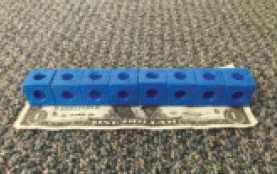
Figure 4. The roll is covered with 179 cubes.
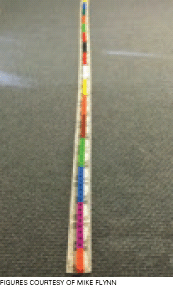
Some students noticed that the dollar was just over eight "cubes" long because there was a little bit of space left that wasn't covered by cubes. This seemed important to some students and less so with others. Once the students had all this information, I invited them to work with their math partners on the problem of how many bills there were in all.
I walked from group to group observing their work, listening to conversations, and at times asking probing questions to get a sense of what students were thinking. I refrained from any direct teaching because the purpose of three-act tasks is to allow students to navigate their own solution pathways. Some students approached the task numerically while others created visual representations. There was also a range in mathematical approaches. Some students used division and multiplication; others used repeated addition or subtraction. When I encountered a group that had an incorrect solution, I made note of it, but didn't intervene to help them fix it. The emphasis of three-act tasks is much more on the problem-solving process than on the solution, and part of the process is working through what to do when you have multiple solutions.
Act 3
The power of multiple solutions and solution pathways is that they allow for rich conversations during Act 3, when students discuss and revise their approaches. Each task is a class effort; talking through different solutions and methods broadens students' understanding and forces them to consider their answers in relation to their peers and to make revisions if necessary.
When it appeared that most students were finished, I called the class together. First, I asked for solutions to the problem. As each group called out their answers, I recorded them on chart paper: 21, 22, 23, and 22 r3. Most students arrived at 22 with 3 remaining but then adjusted their answer to fit the scenario because r3 dollars didn't make sense. Some confusion arose around whether the extra three meant another dollar was needed (23), if a dollar needed to be removed (21), or if they could just disregard the extra 3 because they were part of the last dollar (22). A few groups kept 22 r3 because they didn't know what to do with the remainder.
I then began the discussion by asking students to justify their solutions to the class. The first group I chose was Alli, Josie, and Lila because when I observed them working during Act 2, I could see they had a clear justification for why they added an extra dollar (a good example of a thought-out mathematical argument).
Alli: We got 23 … well, 22 with some extra so we made it 23.
Teacher: Can you walk us through what you did?
Alli: We didn't want to divide, so we multiplied. We did 10 × 8 to get 80 [8 being the number of cubes on the dollar I had shown]. Then we doubled it to get 160.
Lila: That's like 20 × 8.
Alli: Yeah, so then we were 19 away. So that's two more 8s, which is 22 × 8 = 176.
Lila: But then we had 3 left over, so we figured that was another dollar.
Alli: Well, a piece of a dollar, but you can't really have a piece of a dollar so we added one more to get 23.
Teacher: I think just about everyone got 22 with a remainder of 3. I'm curious what others did with that remainder?
Efran: We got 22 with 3 extra too, but we thought that each time you have eight cubes you are losing that little part of a dollar [that isn't covered by the cubes]. And 22 of those little pieces is like another dollar so we took off one dollar instead of adding it like they did.
Teacher: So how many dollars does your group think are in the roll?
Efran: 21
Teacher: Other thoughts?
Kiara: Jessie and I said 22. It's like everyone else. We got 22 with 3 extra cubes. But we thought those extra cubes were on the last dollar.
Jessie: We thought that when you stick another cube on that first eight, part of that cube is going to be on that first dollar. Then the next dollar will have some of that cube and seven more of whatever color it is and so on. [They drew part of their thinking, as shown in Figure 5.]
Figure 5. In Act 3, Kiara and Jessie showed their thinking as they explained their solution.
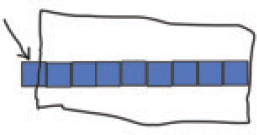
Kiara: Each time you add a dollar, the cubes are kind of moving over, right? We figured the last dollar, number 22, would have part of a stack of eight cubes and then the three extras. So, it's 22 dollars.
The conversation continued with other justifications and revisions of ideas. In the end, the bulk of the students agreed that 22 dollars made the most sense, in large part because of the argument and diagram from Kiara and Jessie. At this point, I shared the Act 3 video that showed me counting out each dollar in the roll. When I got to 22, there were cheers and high fives from the students.
Beyond Worksheets
As you read this vignette, you likely noticed that the bulk of the workload was on the students. They were in charge of observing the situation, asking questions, analyzing information, and deciding how to approach the problem. The justifications for solutions and the debate that ensued involved mostly student voices. The students were active participants and had ownership of the task.
Imagine if I gave them a worksheet with 179 ÷ 8 instead? Would we have had the same level of engagement? Would the session have ended with high fives? It's unlikely. Students were invested because the task was interesting and contextualized. There was something perplexing about the situation, and they wanted resolution. It was also visual, so students could operate on intuition without language getting in the way.
To try a three-act task in your own classroom, you can draw on the work of many educators who design three-act tasks to share freely with the education community. They provide the media for teachers to use, as well as suggestions for how tasks can be modified to support students or extend the work. Robert Kaplinsky, a math specialist in California, has a problem-based lesson search engine. If you teach older students, Dan Meyer has a list of tasks on his website. If you teach younger students, Graham Fletcher has the largest collection of tasks for K–5 students on his site.
The example I shared highlights how powerful this work can be in giving students experiences with authentic problem solving. Students need more access to this kind of work in conjunction with the cohesive mathematics curriculum their teachers use. By including more problem-based learning in classrooms, teachers can ensure they are providing well-rounded and authentic mathematical experiences for students, helping students develop powerful problem-solving skills and a deeper understanding of what it means to engage in mathematics. It's time for us to shift from creating answer-getters to developing problem solvers.






